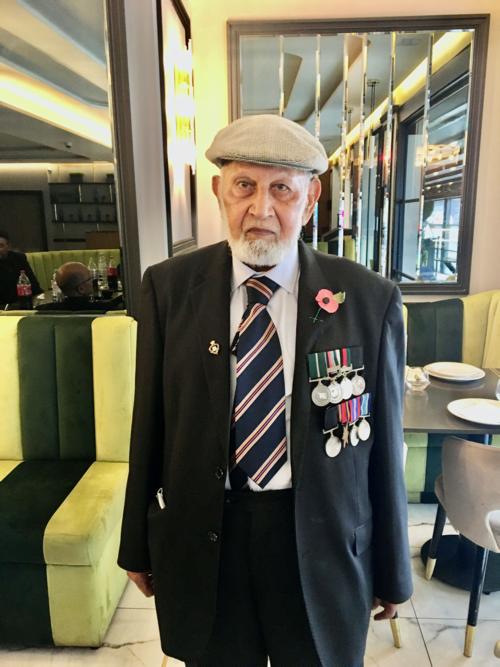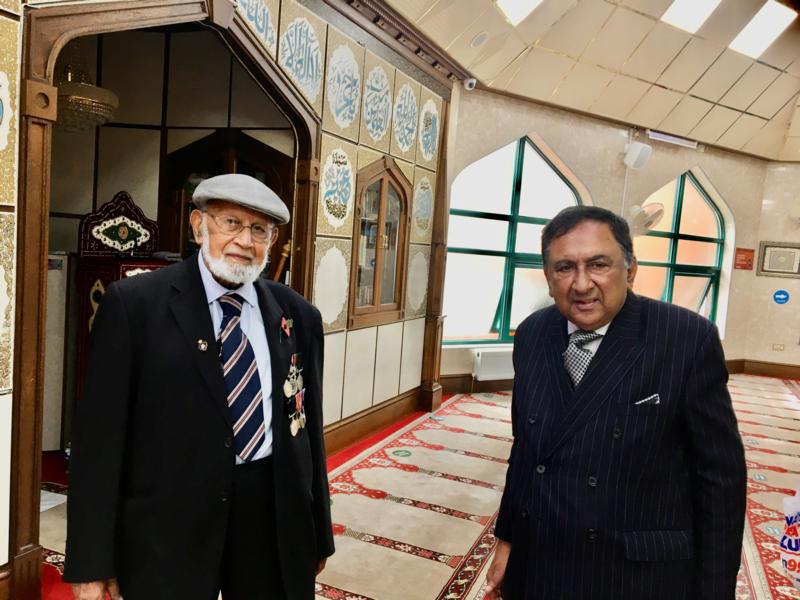© 2023 The National Muslim War Memorial Trust — a Charitable Incorporated Organisation
Registered as a charity with the Charity Commission for England & Wales, number 1191895
Registered Address: First Floor, 10 Queen Street Place, London, EC4R 1BE
On 4 June 2021 our Chairman Lord Sheikh and one of our Associate Members Ikhlaq Hussain attended Friday prayers at the Ilford Islamic Centre. The mosque asked Lord Sheikh to address the congregation about our mission. (See our page NMWMT takes its message to the Ilford Islamic Centre.)
After the prayers, Lord Sheikh and Ikhlaq Hussain met Colonel Mohammad Ghani, a true veteran who is aged 102. Despite his age, he is very fit, physically and mentally. It was a fruitful and pleasant meeting, and we are grateful to Colonel Ghani for sharing his story with us.
Colonel Mohammad Ghani joined the British Indian Army in 1940. He was in a Punjab Regiment and after finishing his training he was posted to Singapore, a port of vital military importance. When the Japanese overran Singapore on 15 February 1942, Colonel Ghani was captured by the Japanese Army alongside 80,000 other servicemen. They were held in various prisoner of war camps, where they were badly treated and humiliated.
Colonel Ghani said that the Japanese were very cruel to prisoners of war: “They gave us little food, often contaminated with calcium hydroxide which caused dysentery. As a result, thousands of prisoners died. They made us clear up dead bodies and made us work in factories with very little food and no breaks.” He was a prisoner for 3½ years, only being freed with other POWs when the Japanese Army formally surrendered on 15 September 1945.
Colonel Ghani was then sent back to his headquarters in Jalandhar (India) and was later deployed in Mandalay (Burma). After the partition of the subcontinent in 1947 Colonel Ghani served in the Pakistan Army until he retired in 1976. He moved to the UK in 1995, and lives with his children and grandchildren in Ilford.
Colonel Ghani was very appreciative of the initiative NMWMT is taking to build a memorial for Muslim soldiers. He said, “It will be great to see the vision coming to fruition and finally getting the recognition for Muslim soldiers who fought for the liberty of this country and for humanity. It is important for a memorial to be erected, and also for educational work to be undertaken on a continuing basis.”

Centenarian Colonel Ghani wearing his eight medals.
“It will be great to see the vision coming to fruition and finally getting the recognition for Muslim soldiers who fought for the liberty of this country and for humanity. It is important for a memorial to be erected, and also for educational work to be undertaken on a continuing basis.”
NMWMT Chairman Lord Sheikh meeting with Colonel Ghani, who was wearing his eight medals.

Stay up to date with the latest news and events from the National Muslim War Memorial Trust.
By clicking “SIGN UP” I agree to the National Muslim War Memorial Trust, and its representatives using the information I provide to contact me about their campaigns and opportunities to get involved. For more information see our Privacy Policy
Help us to achieve our goal of having a permanent memorial to those Muslims who have fought and served during times of war.
Raised so far
Card donations using the donations box always cost processing fees. Direct to bank donations, if you can make them, cost us no processing fees.
Account name: The National Muslim War Memorial Trust
Sort code: 30-90-89
Account number: 83524768
Please use the form on the Contact page to tell us about your direct to bank donation so we can thank you.
If you are a UK taxpayer, please download our Gift Aid form and complete and return it to us as indicated on the form.
If donating from overseas, our international banking details are:
BIC: LOYDGB21256
IBAN: GB45 LOYD 3090 8983 5247 68
We are registered with Give as you Live. This means we will receive a small donation if you do your online shopping via Give as you Live. You can sign up to support us via this link.
© 2023 The National Muslim War Memorial Trust — a Charitable Incorporated Organisation
Registered as a charity with the Charity Commission for England & Wales, number 1191895
Registered Address: First Floor, 10 Queen Street Place, London, EC4R 1BE